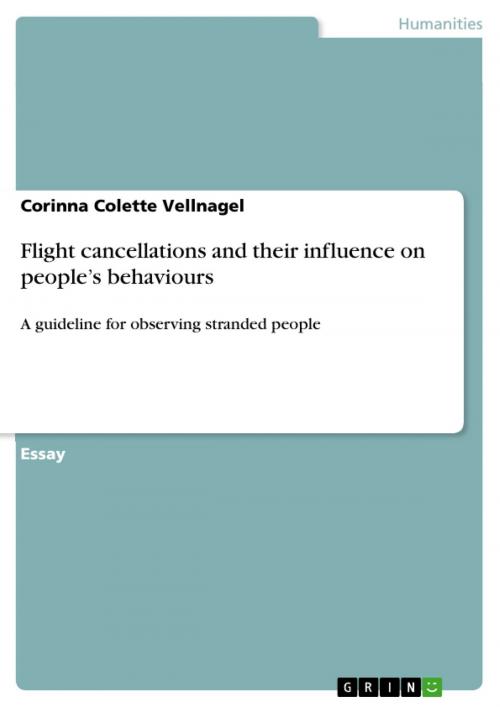Flight cancellations and their influence on people's behaviours
A guideline for observing stranded people
Nonfiction, Social & Cultural Studies, Social Science, Methodology| Author: | Corinna Colette Vellnagel | ISBN: | 9783640836666 |
| Publisher: | GRIN Verlag | Publication: | February 19, 2011 |
| Imprint: | GRIN Verlag | Language: | English |
| Author: | Corinna Colette Vellnagel |
| ISBN: | 9783640836666 |
| Publisher: | GRIN Verlag |
| Publication: | February 19, 2011 |
| Imprint: | GRIN Verlag |
| Language: | English |
Essay from the year 2011 in the subject Sociology - Methodology and Methods, grade: Merit, The University of Surrey (Department of English), course: Research Methodse, language: English, abstract: Stress is a universally known phenomenon and in stress situations everybody acts and behaves differently; some people stay calm in certain situations while others completely freak out. Stress situations occur every day, but not all are recognised as such. There are stress situations which appear regularly, such as an overstuffed schedule; and there are those stress situations which primarily have nothing to do with a tight schedule, because they only occur once in a while. Imagine the following: You are at an airport and about to fly home, on holidays or away for work and at the airport there is nothing but total chaos because almost all flights have been cancelled due to unpredictable incidents such as bad weather conditions or a volcanic ash cloud, which both occurred in 2010. How do you think would most people react? There are not many ways to find out how people behave in this specific stress situation. Interviewing people at the airport would be an option, handing out questionnaires would be another option; but without a doubt people would not be in the cheer to answer questions or fill out a form; and collecting data afterwards would probably distort the results, because it is not contemporary enough. This paper deals with the research method observation; in order to understand how observation can be used in research, chapter two sets the theoretical background on observation methods, including error sources and application possibilities. The third chapter gives a theoretical approach of evaluating data through observation. This approach deals with people's behaviours while being stranded at an international airport such as Heathrow, Frankfurt or Paris. How do people deal with such a stressful situation? What kind of reactions and behaviours can be observed when people find out that there flight has been cancelled? This kind of stress is not comparable to everyday stress; therefore the working definition of a stress situation used in this work, which is based on the ideas of Barton Cunningham (2000), is as follows: Stress is a universally appearing human response which resulted from the apperception of and distressing and intense experience. It may also be referred to as conflict, anxiety, frustration, conflict, emotional trauma and pressure. Last but not least, the paper concludes with a short review and possible chances and difficulties in chapter four.
Essay from the year 2011 in the subject Sociology - Methodology and Methods, grade: Merit, The University of Surrey (Department of English), course: Research Methodse, language: English, abstract: Stress is a universally known phenomenon and in stress situations everybody acts and behaves differently; some people stay calm in certain situations while others completely freak out. Stress situations occur every day, but not all are recognised as such. There are stress situations which appear regularly, such as an overstuffed schedule; and there are those stress situations which primarily have nothing to do with a tight schedule, because they only occur once in a while. Imagine the following: You are at an airport and about to fly home, on holidays or away for work and at the airport there is nothing but total chaos because almost all flights have been cancelled due to unpredictable incidents such as bad weather conditions or a volcanic ash cloud, which both occurred in 2010. How do you think would most people react? There are not many ways to find out how people behave in this specific stress situation. Interviewing people at the airport would be an option, handing out questionnaires would be another option; but without a doubt people would not be in the cheer to answer questions or fill out a form; and collecting data afterwards would probably distort the results, because it is not contemporary enough. This paper deals with the research method observation; in order to understand how observation can be used in research, chapter two sets the theoretical background on observation methods, including error sources and application possibilities. The third chapter gives a theoretical approach of evaluating data through observation. This approach deals with people's behaviours while being stranded at an international airport such as Heathrow, Frankfurt or Paris. How do people deal with such a stressful situation? What kind of reactions and behaviours can be observed when people find out that there flight has been cancelled? This kind of stress is not comparable to everyday stress; therefore the working definition of a stress situation used in this work, which is based on the ideas of Barton Cunningham (2000), is as follows: Stress is a universally appearing human response which resulted from the apperception of and distressing and intense experience. It may also be referred to as conflict, anxiety, frustration, conflict, emotional trauma and pressure. Last but not least, the paper concludes with a short review and possible chances and difficulties in chapter four.















